2011年高考英语(人教版)要点梳理+重点突破:必修2 Unit 4 Wildlife protection
- 格式:doc
- 大小:152.50 KB
- 文档页数:18
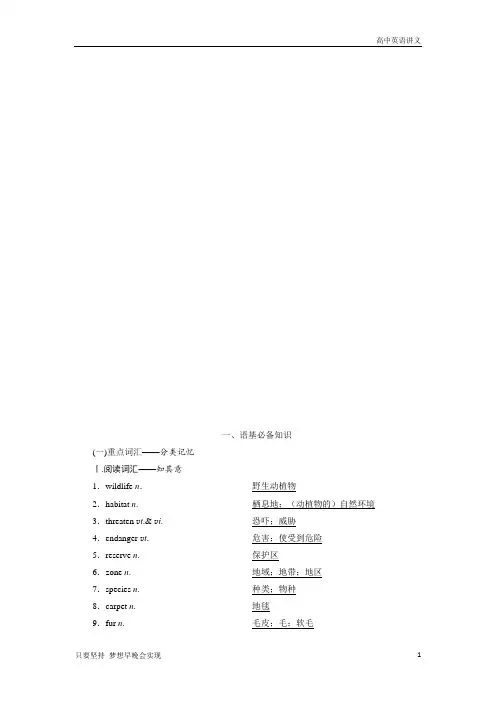
一、语基必备知识(一)重点词汇——分类记忆Ⅰ.阅读词汇——知其意1.wildlife n.野生动植物2.habitat n. 栖息地;(动植物的)自然环境3.threaten v t.& v i. 恐吓;威胁4.endanger v t. 危害;使受到危险5.reserve n. 保护区6.zone n. 地域;地带;地区7.species n. 种类;物种8.carpet n. 地毯9.fur n. 毛皮;毛;软毛10.rub v t. 擦;摩擦11.mosquito n. 蚊子12.insect n. 昆虫13.income n. 收入14.county n. 县;郡15.incident n. 事件;事变16.fierce adj. 凶猛的;猛烈的17.extinction n. 灭绝;消亡Ⅱ.核心词汇——写其形1.certain adj.确定的;某一;一定2.importance n. 重要(性)3.contain v t. 包含;容纳;容忍4.attention n. 注意;关注;注意力5.bite v t.& v i. 咬;叮;刺痛6.loss n. 损失;遗失;丧失7.ending n. 结局;结尾8.decrease v i.& v t. 减少;(使)变小或变少9.laughter n. 笑;笑声10.affect v t. 影响;感动;侵袭Ⅲ.拓展词汇——通其变1.protect v t.保护→protection n.保护2.respond v i.回答;响应;做出反应→response n.回答;反应3.distant adj.远的;远处的→distance n.距离;远方4.power v.给……提供动力→powerful adj.强大的;有力的5.secure adj.安全的;可靠的→security n.安全;可靠6.inspect v t.检查;视察→inspection n.检查→inspector n.检查员7.appreciate v t.鉴赏;感激;意识到→appreciation n.欣赏;感谢;鉴别8.harm n.& v t.损害;危害→harmful adj.有害的→harmless adj.无害的9.mercy n.仁慈;宽恕;怜悯→merciful adj.宽恕的;仁慈的→merciless adj.残忍的;无情的10.faith n.信念;信仰→faithful adj.忠诚的;忠实的→faithfully ad v.忠诚地;忠实地11.succeed v i.成功v t.接替;继任→success n.成功→successful adj.成功的→successfully ad v.成功地12.employ v t.雇用;利用(时间、精力等)→employment n.雇用;利用→employer n.雇主;老板→employee n.雇员13.dust n.灰尘;尘土;尘埃→dusty adj.布满灰尘的14.relief n.(痛苦或忧虑的)减轻或解除;减轻痛苦的事物→relieve v t.使减轻;缓解1.后缀-ful构成的形容词小结①powerful强大的;有力的②harmful 有害的③doubtful 怀疑的;疑惑的④faithful 忠诚的⑤forgetful 健忘的⑥hopeful 充满希望的2.“派生名词(v.+-ing)”集锦①ending结局;结尾②training 训练;培养③feeling 感觉;感情④painting 绘画;油画⑤meeting 会议⑥beginning 开始;开端3.巧记各种“事件”①incident n.事件;事变②accident n. 事故③traffic accident 交通事故④event n. 重大事件;比赛项目高中英语讲义⑤sports event 体育赛事(二)重点短语——记牢用活1.die__out灭亡;逐渐消失2.in__peace 和平地;和睦地;安详地3.in__danger__(of) 在危险中;垂危4.in__relief 如释重负;松了口气5.burst__into__laughter 突然笑起来;大声笑了出来6.protect...from 保护……不受……(危害)7.pay__attention__to 注意8.come__into__being 形成;产生9.according__to 按照;根据……所说10.so__that 以至于;结果11.without__mercy 毫不怜悯地12.do__harm__to 对……有害1.“come into+n.”短语一览①come into being形成;产生②come into effect/force 开始生效;开始实行③come into existence 形成;产生;开始存在④come into power 开始执政⑤come into use 开始使用2.“出现与消失”家族①die out灭亡;逐渐消失②disappear v i. 消失;失踪③appear v i. 出现④show up 出现⑤turn up 出现;发生(三)重点句式——背熟巧用Ⅰ.语境填词——根据提示写出该词的适当形式1.(2019·全国卷Ⅲ)If I succeed(成功) in managing one, I will open more.2.(2019·天津卷)To many people,technology means computers, handheld devices, or vehicles that travel to distant(远处的) planets.3.(2017·全国卷Ⅱ)I’m certain(确定的) that you will like it once you visit the paper-cutting exhibition.4.(2018·北京卷)With all the programs, teamwork is key as trainees learn the importance(important) of leadership and being part of a bigger task.5.(全国卷Ⅱ书面表达)Our school photography club is going to hold an International High School Student Photography Show, the theme of which is environmental protection(protect).6.Due to the strict traffic regulations on drunken driving, the number of accidents from it has greatly decreased(decrease).7.Mary is a very stubborn girl and she is seldom affected(affect) by other’s opinion.8.He was determined to try his best to make up for the loss(lose).Ⅱ.语境品词——写出加黑词汇在语境中的意义1.(2019·北京卷阅读B)Moore then used her savings to get her business off the ground.Afterwards, she and her father secured their first business meeting with a supermarket owner, who finally agreed to sell Moore’s product—CanCandy.弄到,获得2.(2019·天津卷阅读C)If a predator can eat several species, it can survive the extinction of one of them.灭绝3.(2018·全国卷Ⅰ阅读A)Your guide will provide a history lesson about the trees and the famous monuments where they blossom. Reserve your spot before availability—and the cherry blossoms—disappear!预定4.(2017·全国卷Ⅰ七选五)If anyone had told me three years ago that I would be spending most of my weekends camping, I would have laughed heartily.Campers, in my eyes, were people who enjoyed insect bites, illcooked meals, and uncomfortable sleeping bags.咬;叮;刺痛5.(2017·江苏卷单项填空)The disappearance of dinosaurs is not necessarily caused by astronomical incidents. But alternative explanations are hard to find.事件Ⅲ.派生词练习——用所给词的适当形式填空1.In the letter, he thanked me for my appreciating his work and my appreciation made him confident again.(appreciate)2.None of the students responded to her question; in other words, her question failed to get a response from any of the students.(respond)3.The man is always distant towards his neighbors, so his neighbors often keep him at a distance.(distant)4.Eating too much every day is harmful to our health; that is to say, eating too much every day does harm to our health.(harm)5.He succeeded his father as manager of the company.Soon their business became very successful.Lots of people wanted to know the secret of his success.(succeed) 6.The employer decided to employ Tom as her secretary and she hoped to have a talk with her employee before he came to work.(employ)Ⅳ.选词成篇1.came__into__being.2.According__to the research, with our environment becoming worse and worse, many animals can’t adapt themselves to the new changes so that many species are in danger of3.dying__out. It is high time that we should4.pay__attention__to__the topic of wildlife protection. Firstly, we should start a campaign to raise the public awareness of protecting the wildlife. Secondly, we should take measures to5.protect animals from being hurt. Last but not least, it is very important to keep the balance of nature. Only when we protect the wildlife and maintain the natural beauty can we live6.in__peace.Ⅴ.完成句子1.(2018·全国卷Ⅰ书面表达)如果你按照我告诉你的去做,我相信你会玩得很愉快。
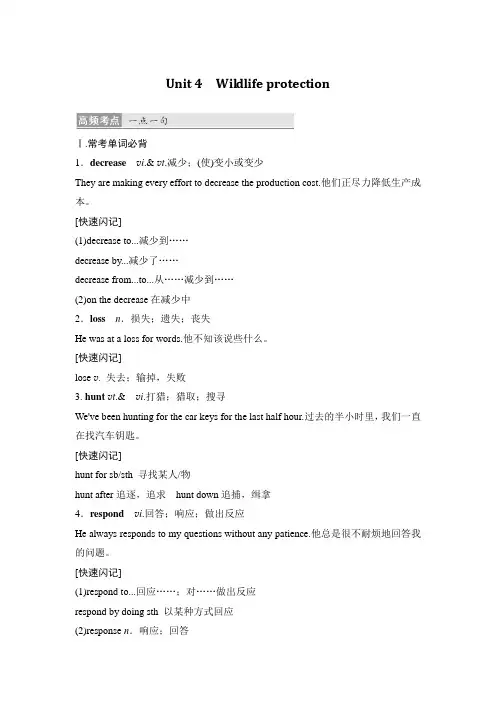
Unit 4Wildlife protectionⅠ.常考单词必背1.decrease v i.& v t.减少;(使)变小或变少They are making every effort to decrease the production cost.他们正尽力降低生产成本。
[快速闪记](1)decrease to...减少到……decrease by...减少了……decrease from...to...从……减少到……(2)on the decrease在减少中2.loss n.损失;遗失;丧失He was at a loss for words.他不知该说些什么。
[快速闪记]lose v. 失去;输掉,失败3. hunt v t.& v i.打猎;猎取;搜寻We've been hunting for the car keys for the last half hour.过去的半小时里,我们一直在找汽车钥匙。
[快速闪记]hunt for sb/sth 寻找某人/物hunt after追逐,追求hunt down追捕,缉拿4.respond v i.回答;响应;做出反应He always responds to my questions without any patience.他总是很不耐烦地回答我的问题。
[快速闪记](1)respond to...回应……;对……做出反应respond by doing sth 以某种方式回应(2)response n.响应;回答5.relief n.(痛苦或忧虑的)减轻或解除;减轻痛苦的事物It was a relief to be able to talk to someone about it.能和别人谈谈这件事,感到舒心多了。
[快速闪记](1)in relief如释重负;松了口气to one's relief令人感到欣慰的是(2)relieve v t.减轻;缓解;消除relieved adj.宽慰的;不再忧虑的6.mercy n.仁慈;宽恕;怜悯It's a mercy she wasn't seriously hurt.很幸运她伤得不重。

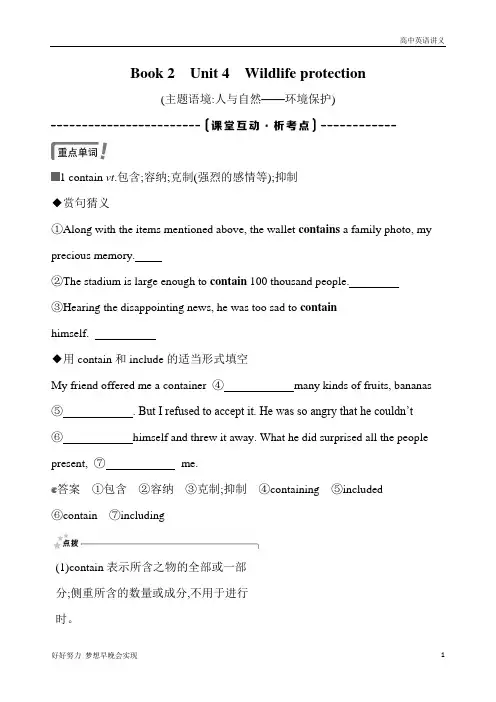
Book 2Unit 4Wildlife protection(主题语境:人与自然——环境保护)1 contain vt.包含;容纳;克制(强烈的感情等);抑制◆赏句猜义①Along with the items mentioned above, the wallet contains a family photo, my precious memory.②The stadium is large enough to contain 100 thousand people.③Hearing the disappointing news, he was too sad to containhimself.◆用contain和include的适当形式填空My friend offered me a container ④many kinds of fruits, bananas⑤. But I refused to accept it. He was so angry that he couldn’t⑥himself and threw it away. What he did surprised all the people present, ⑦me.答案①包含②容纳③克制;抑制④containing⑤included⑥contain⑦including(1)contain表示所含之物的全部或一部分;侧重所含的数量或成分,不用于进行时。
(2)include指作为整体中的一部分而被包括进去,通常指同类。
常使用“including+被包括部分”或“被包括部分+included”的结构。
助记2 affect vt.影响;感动;侵袭◆单句填空①With the aid of the government, those people (affect) by the earthquake have moved to the new settlements.②If a basketball star is, for example, trying to gain a high personal point total, he may take a shot himself when it would be better to pass the ball to a teammate,(affect) the team’s performance.(2019北京)③They are extremely important in the safe and (effect) running of our programmes. (2019北京)◆赏句猜义④The researchers call the effect“enclothed cognition”, suggesting that all manner of different clothes probably affect our cognition in many differentways.⑤No area was spared or unaffected, from the foggy northern coast to the Sierra Nevada Mountains to the San Gabriels above Los Angeles.(2019浙江阅读理解)◆句型升级Many young people were affected by his story and began to pay attention to wildlife protection.→⑥, many young people began to pay attention to wildlife protection. (分词作状语)答案①affected②affecting③effective④影响;影响⑤未受影响的⑥Affected by his story(1)be deeply affected by被……深深打动be affected by the heat/the cold中暑/着凉(2)effect n.作用;影响have an effect/influence on对……产生影响(3)effective adj.有效的;起作用的联想表“影响”的其他动词短语:have an impacton。
![人教新课标知识点复习-必修二 Unit 4 Wildlife protection[1]](https://uimg.taocdn.com/26f2c1770029bd64783e2cf0.webp)
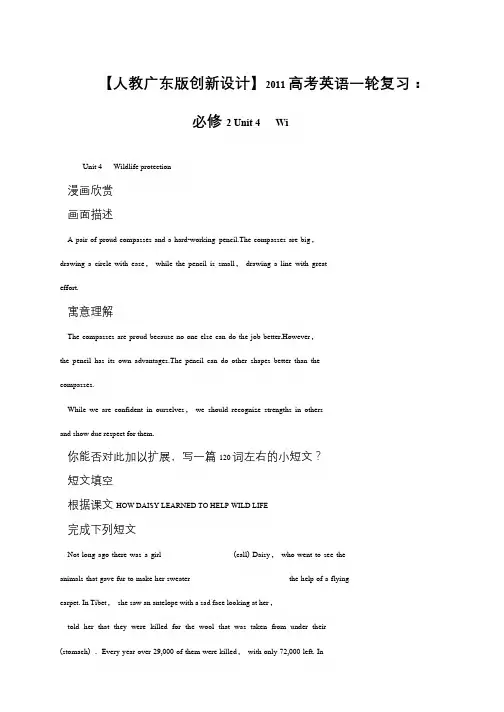
【人教广东版创新设计】2011 高考英语一轮复习:必修2 Unit 4WiUnit 4Wildlife protection漫画欣赏画面描述A pair of proud compasses and a hard-working pencil.The compasses are big,drawing a circle with ease,while the pencil is small,drawing a line with great effort.寓意理解The compasses are proud because no one else can do the job better.However,the pencil has its own advantages.The pencil can do other shapes better than the compasses.While we are confident in ourselves,we should recognize strengths in others and show due respect for them.你能否对此加以扩展,写一篇120 词左右的小短文?短文填空根据课文HOW DAISY LEARNED TO HELP WILD LIFE完成下列短文Not long ago there was a girl (call) Daisy,who went to see the animals that gave fur to make her sweater the help of a flying carpet. In Tibet,she saw an antelope with a sad face looking at her,told her that they were killed for the wool that was taken from under their (stomach).Every year over 29,000 of them were killed,with only 72,000 left. In。
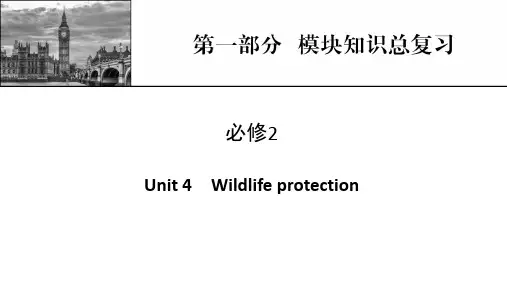
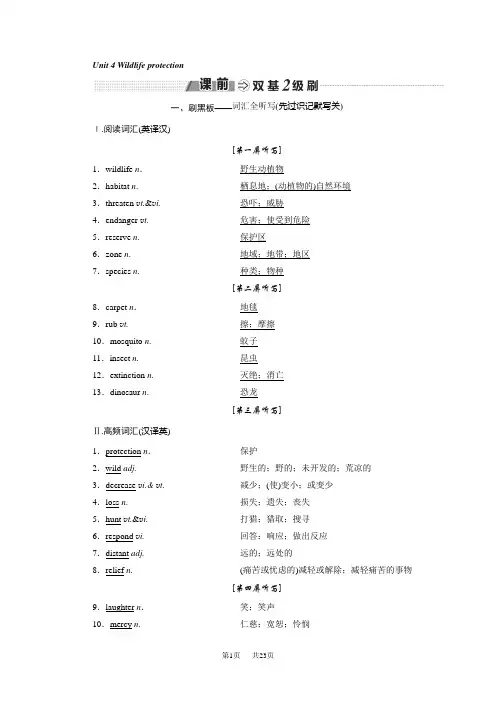
Unit 4 Wildlife protection一、刷黑板——词汇全听写(先过识记默写关)Ⅰ.阅读词汇(英译汉)[第一屏听写]1.wildlife n.野生动植物2.habitat n. 栖息地;(动植物的)自然环境3.threaten v t.&v i.恐吓;威胁4.endanger v t.危害;使受到危险5.reserve n. 保护区6.zone n. 地域;地带;地区7.species n. 种类;物种[第二屏听写]8.carpet n.地毯9.rub v t.擦;摩擦10.mosquito n. 蚊子11.insect n. 昆虫12.extinction n. 灭绝;消亡13.dinosaur n. 恐龙[第三屏听写]Ⅱ.高频词汇(汉译英)1.protection n.保护2.wild adj.野生的;野的;未开发的;荒凉的3.decrease v i.& v t.减少;(使)变小;或变少4.loss n. 损失;遗失;丧失5.hunt v t.&v i.打猎;猎取;搜寻6.respond v i.回答;响应;做出反应7.distant adj.远的;远处的8.relief n. (痛苦或忧虑的)减轻或解除;减轻痛苦的事物[第四屏听写]9.laughter n.笑;笑声10.mercy n. 仁慈;宽恕;怜悯11.certain adj.确定的;某一;一定12.importance n. 重要(性)13.contain v t.包含;容纳;容忍14.powerful adj.强大的;有力的15.affect v t.影响;感动;侵袭[第五屏听写]16.attention n.注意;关注;注意力17.appreciate v t.鉴赏;感激;意识到18.succeed v i.成功v t.接替;继任19.secure adj.安全的;可靠的20.income n. 收入21.employ v t.雇用;利用(时间、精力等) 22.harm n.&v t.损害;危害[第六屏听写]23.bite v t.&v i.咬;叮;刺痛24.inspect v t.检查;视察25.incident n. 事件;事变26.disappearance n. 消失27.fierce adj.凶猛的;猛烈的28.fur n. 毛皮;毛;软毛29.dust n. 灰尘;尘土;尘埃30.ending n. 结局;结尾[第七屏听写]31.die_out灭亡;逐渐消失32.in_peace 和平地;和睦地;安详地33.in_danger_(of) 在危险中;垂危34.in_relief 如释重负;松了口气35.burst_into_laughter 突然笑起来;大声笑了出来36.protect_..._from 保护……不受……(危害) 37.pay_attention_to 注意38.come_into_being 形成;产生39.according_to 按照;根据……所说40.so_that 以至于;结果二、刷清单——热身自盘点(再过基本应用关) (一)核心单词(二)常用短语(四)初中考点再回顾一、过重点单词——纵引横联超人一点1.contain vt.包含;容纳;容忍;克制(强烈的感情等)[高考佳句]There are 60 students in our class, containing35 boys and 25 girls.(·天津高考书面表达)我们班有60名学生,包含35名男生和25名女生。
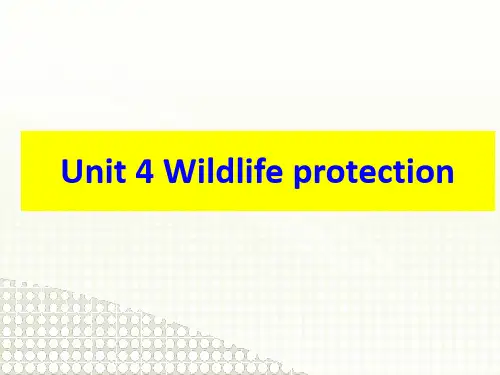
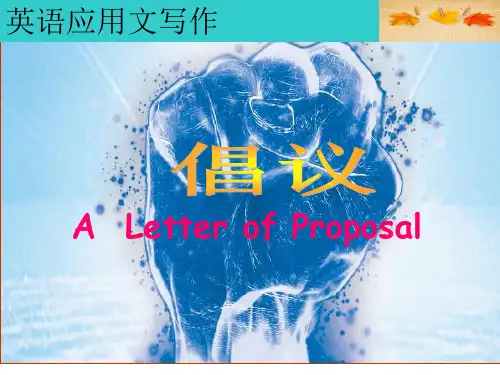
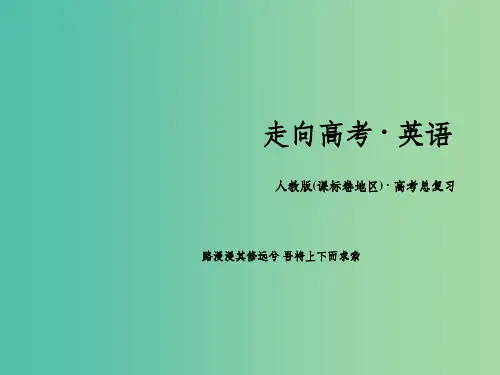
Unit 2 Wildlife Protection(教材P14)Our planet's is dying out at an alarming rate.我们星球的……正在以惊人的速度消亡。
(1)die out灭绝;逐渐消失;逐渐熄灭die away逐渐减弱,逐渐模糊,逐渐消失die down 逐渐降低,逐渐平息die off 相继死去die of 死于(内因)die from 死于(外因)①The sound of the engine died away as the car drove into the distance.随着汽车向远方开去,发动机声渐渐消失。
②After the talk the man's anger died down a bit.谈话之后,这名男子的愤怒平息了一点。
③With society developing,many old customs are dying out.随着社会的发展,许多古老的风俗在逐渐消失。
(2)alarming adj.惊人的;使人惊恐的1)alarm vt.使惊恐;使害怕;使担心n. 警报;恐慌in alarm 惊恐地give the alarm to... 给……发警报2)alarmed adj. 惊恐的;忧虑的be alarmed at/by... 对……大为惊慌be alarmed to do... 做……感到恐慌④The little girl was alarmed at the snake.这个小女孩被蛇吓了一跳。
⑤The boy was alarmed to see (see) the bear walking to him.这个男孩看到熊走向他,很是惊慌。
⑥We were alarmed (alarm) at the alarming (alarm) scream as the scream did alarm us.我们被那令人惊恐的尖叫声吓了一跳,因为那叫声的确使我们感到惊恐。
【知识点汇总】新人教版必修二Unit 2 Wildlife Protection【词汇短语】1. Our planet’s wildlife is dying ou t at an alarming rate. (P14)我们星球上的野生动植物正以惊人的速度灭绝。
die out 灭亡;逐渐消失【例句】因栖息地正受到破坏,这一物种已濒临灭绝。
【拓展】die off 相继死去be dying for sth. 渴望某物die from/of ... 死于……die down 逐渐变弱,逐渐平息be dying to do sth. 渴望做某事die away 逐渐减弱,逐渐消失2. Our planet’s wildlife is dying out at an alarming rate. (P14)我们星球上的野生动植物正以惊人的速度灭绝。
rate /reɪt/ n. 速度;(比)率vt. 划分等级【搭配】at a(n) ... rate 以……速度interest rates 利率the birth/death rate 出生率/死亡率a high success/failure rate 很高的成功率/失败率【例句】婴儿成长的速度并非一成不变,而是长长停停,停停长长。
她目前排名世界第二。
【拓展】后缀-rate表示“程度;水平(与first、second等词连用,表明你认为某物属于哪种程度或水平)”。
这所学校培养出很多一流学生。
它是这个城市中评价最好的旅馆之一,这是有充分理由的。
(2021·新高考卷)3. We must make people aware of the problem and help protect the endangered wildlife before it’s too late! (P14)我们必须趁现在还来得及让人们意识到这个问题,帮助保护濒临灭绝的野生动植物!aware /ə'weə(r)/ adj. 知道;发觉;有……意识的【搭配】make sb. aware of ... 使某人知道/意识到……be/become/feel aware of/that ... 知道/意识到……as far as I’m aware ( =as far as I know) 据我所知【例句】我们应该知道许多动物濒临灭绝。
19.n. 商品;货物20.n. 生物;动物21.v t. 减少22.adj. 由于;因为23.n. 皮;皮肤Ⅰ.根据语境和汉语提示写出正确的单词1.The local government put up attractive (海报) to guide the visitors to the cherry picking gardens.2.We must try to live in peace and (和谐) with ourselves and those around us.3.It is high time that we should take (措施;方法) to keep the air from being polluted.4.The attraction that arouses the greatest appreciation in the (保护区) is Tianchi or the Lake of Heaven.5.It is reported that the mountainous village has made a large (利润;利益) from tourism.6.The man was walking in the wood when he was (攻击) by a snake.7.My suggestion is that the column of entertainment should be (去除).8.With great effort, she (减少) her weight by five kilograms in the past 7 days.四、经典句式1.This is why ...这就是……的原因(这就是我们来到此地的原因) —to observe Tibetan antelopes. 2.强调句型(就是这个原因) the WWF constantly put up information to stir up public interest in the welfare of the planet.3.“only+状语从句”位于句首时,主句使用部分倒装(只有当我们学会生存) in harmony with nature can we stop (我们能够阻止) being a threat to wildlife and to our planet.4.When it comes to ...意为“当谈及/涉及……时”(谈到野生生物保护), all species —the good, the bad, and the ugly —should be treated equally.5.so that引导目的状语从句,意为“为了;以便”Is it right to make animals homeless (以便) humans can have more paper?,Ⅳ.补全句子1.Many people hunt antelopes for their fur to make money.their number decreases rapidly.许多人捕猎羚羊以获取它们的皮毛来赚钱。
必修2 Unit4 Wildlife protectionI.单元基础知识一、核心单词1.________ v.咬;叮2.________ n.保护3.________ n.笑;笑声4.________ vt.包含;容纳5.________ v.打猎;搜寻6.________ v.恐吓;威胁7.________ vt.检查;视察8.________ n.& vt.损害;危害9.________ n.减轻;解除10.________ adj.遥远的;远处的11.________ vt.感激;鉴赏12.________ vt.影响;感动13.________ n.仁慈;宽恕;怜悯14.________ n.注意;关注;注意力15.________ v.减少;变少16.________ vi.回答;响应;作出反应17.________ n.灰尘;尘土;尘埃18.________ v.成功;继任19.________ vt.雇用;利用20.________ adj.安全的;可靠的二、高频短语1.结果________2.灭绝________3.和平地;和睦地________4.在危险中________5.保护……不受……(伤害)________6.注意________7.形成;产生 ________8.过去常常做某事________9.被用来做________10.按照;根据……所说________11.飞走________12.一定数量的________13.在……上获得成功 ________14.转身________15.如释重负;松了口气________16.渴望做某事________17.残忍地;毫不留情地________18.突然笑起来________19.以至于;结果________20.对……有害________三、重点句型(填空)1.Please, take me to a distant land ________ I can find the animal ________ gave fur to make this sweater.请带我到一个遥远的地方,在那里我可以找到为制作这件毛衣而提供毛绒的动物。
必修2Unit 4Wildlife protection要点梳理高效梳理·知识备考●重点单词1〃protection n.保护→protect v.保护→protective adj.保护的,防护的2〃decrease vi. & vt.减少;(使)变小或变少3〃loss n.损失;遗失;丧失→lose v.遗失,丢失→loser n.输家;失败者→lost adj.遗失的,失去的4〃hunt vt. & vi.打猎;猎取;搜寻5〃respond vi.回答;响应;作出反应6〃certain adj.确定的;无疑的;某种7〃contain vt.包含;容纳;容忍→container n.容器8〃powerful adj.强大的;有力的→powerfully adv.有力地→power v.给……提供动力9〃affect vt.影响;感动;侵袭10〃appreciate vt.鉴赏;感激;意识到11〃succeed vi.成功vt.接替;继任12〃employ vt.雇用;利用(时间、精力等)13〃harm n. & vt.损害;危害→harmful adj.有害的14〃bite vt. & vi.咬;叮;刺痛→bit(过去式)→bitten(过去分词)15〃inspect vt.检查;视察16〃fierce adj.凶猛的;猛烈的→fiercely adv.猛烈地→fierceness n.猛烈●重点短语1〃die out灭亡;逐渐消失2〃in peace 和平地;安详地;和睦地3〃in danger(of) 在危险中,垂危4〃in relief 如释重负5〃burst into laughter 突然笑起来6〃protect...from保护……不受……(危害)7〃pay attention to注意8〃come into being形成;产生9〃according to按照;根据……所说10〃do harm to危害11〃without mercy 毫不留情地12〃respond to对……作出回答●重点句型They lived on the earth tens of millions of years ago, long before humans came into being...千百万年前它们(恐龙)就在地球上生活,比人类的出现要早得多……●高考范文(2009·福建卷)某英语报社拟成立“微笑俱乐部”,现向全球征募会员。
要求申请者提交一篇题为I Want to Smile的英语短文。
请你以申请者的身份,根据以下思路图的提示用英语写一篇短文。
注意:1.根据思路图适当展开,以使行文连贯;2.词数:120左右。
I Want to Smile____________________________________________________________________________________________[范文]I Want to SmileThere are many advantages of smiling. It can not only make us happy, but also please others. If we smile at life, life will smile on us in return. So I want to smile at all whenever and wherever possible,First, I would like to smile at my parents because they have given me my life and take all the troubles to bring me up. They arrange almost everything for me. With their help, I have made great progress. I would like to say “Thank you”to them with a smile. Then my smile should go to myself, for only in this way can I gain more confidence in smiling my troubles away and live a better life.In a word, let's greet every day with a smile. Tomorrow is another day.考点探究互动探究·能力备考Ⅰ.词汇短语过关1〃respond vi.回答,答复;响应,作出反应response n. 回答,回复;反应respond to sb./sth.回答(比answer, reply to正式)respond to sb./sth. (with/ by sth.) 用……回应某人(事)respond to (疾病、身体的受伤部分)对医药有良好反应in response to 作为对……的反应[即学即练1](1)They still haven't ____________ my letter.他们至今仍没有回我的信。
(2)He ____________ my suggestion ________ a laugh/______ laughing. 他对我的建议报以一笑。
(3)His illness didn't ____________ treatment by drugs.他的疾病对药物治疗没有反应。
(4)My mother opened the door ____________________ the knock, but there was no one outside.听到敲门声后,我妈妈打开了门,但外面一个人都没有。
responded toresponded towithbyrespond toin response to2.certain adj. 确定的;无疑的;某(种)(1)作“某(种)”讲时,同义于some。
但some 前不加冠词。
for a certain reason=for some reason 由于某种原因certain professors=some professors 某些教授a certain amount of time 相当一段时间(2)作“确信的,有把握的”讲时,同义于sure。
但是certain 的主语既可以是人,也可用于It is certain that...句型,而sure 主语只能是人。
“be certain/sure+从句”(人)有把握/确信……(表示主语的信念)be certain/sure of/about sth. (人)确信(表示主语的信念)be certain/sure to do sth. 必定/肯定会做某事(主语常为二、三人称,表示说话人的信念)“make certain/sure+从句”弄清楚/确保……make certain/sure of/about sth. 把某件事情弄清楚for certain/sure 确定地,确切地(做状语)It is certain that... 一定会……(不能用sure)[即学即练2](1)There was _________________ in his manner.他的态度有点冷淡。
(2)Are you ____________________ it?你对此有把握吗?(3)He is __________________ his duty.他肯定会尽职。
(4)_________________ he has wronged me.我确信他冤枉了我。
他们队肯定会赢得比赛。
a certain coldnesscertain about/ofcertain to doI’m certain thatIt’s certain that3.contain vt. 包含;容纳(=hold);抑制(=control)[即学即练3](1)His paper ___________ no mistakes at all.他的试卷没有一点错误。
(2)Orange juice ____________ things which help keep you healthy.橘汁里含有有益于健康的东西。
(3)This bottle ___________ two glasses of beer.这个瓶子可容纳两杯啤酒。
(4)He couldn't ____________ for joy.他不胜欢喜。
containedcontainscontainscontain himself4.affect vt.影响;感动;(疾病)侵袭be greatly/deeply affected很/深受感动be affected by heat/cold中暑/着凉be affected with high fever发高烧[即学即练4](1)The amount of rain ______ the growth of crops.降雨量直接影响庄稼生长。
(2)One of her lungs ____________ a little so that she has to rest.她的一叶肺有些感染,所以她不得不休息。
(3)The audience ____________________ by his speech.听众被他的演讲深深打动了。
affectsis affectedwere deeply affected5.appreciate vt. 欣赏;感激;喜欢appreciation n. 欣赏;感激appreciate sth. (thank sb.) 感激某事或某人appreciatedoing sth.感激做某事one/one's doing sth.感激某人做某事I would appreciate it if... 如果……,我将不胜感激。
[即学即练5](1)He highly __________________________.他非常感谢他的帮助。
(2)We shall ___________________________ you again.我们将很高兴再次收到您的来信。
(3)I really ____________________________ to the party.你能来参加这次聚会我太高兴了。